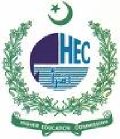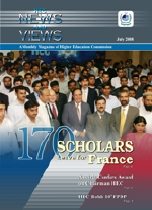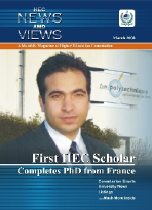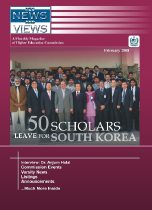Dr. Athar Osama
 Over the last several years of the current government, the Higher Education Commission (HEC) has funded thousands of scholarships and fellowships for Pakistanis to do PhD and Post-Doctoral work both at home and abroad. One of the most important of these programs has been the Foreign PhD Fellowships Scheme that funds as many as 1000 PhD fellowships per year for Pakistani students to go to countries around the world – mostly in Eastern Europe and South East Asia – to do their doctoral studies and return back after a specified duration of time to serve in Pakistani institutions.
Over the last several years of the current government, the Higher Education Commission (HEC) has funded thousands of scholarships and fellowships for Pakistanis to do PhD and Post-Doctoral work both at home and abroad. One of the most important of these programs has been the Foreign PhD Fellowships Scheme that funds as many as 1000 PhD fellowships per year for Pakistani students to go to countries around the world – mostly in Eastern Europe and South East Asia – to do their doctoral studies and return back after a specified duration of time to serve in Pakistani institutions.
Now that the first cohorts of these HEC scholars are completing their studies, the question arises: Will they return to Pakistan? And if they do, will they stay?
The terms of the program, I am told, are designed in a manner so as to dissuade these students from staying abroad after finishing their studies. This is done through a number mechanisms, including, provisions that discourage foreign employers and universities from hiring these students, and sending them to countries that are deemed not-so-hospitable to immigrant workers because of language barriers or immigration restrictions. Other initiatives to attract and absorb this talent back home include the ambitious plan of making several “world class” universities with international collaboration in Pakistan. Much has been said, and will continue to be said, about the latter and its fate continues to be in question.
While one would hope that these mechanisms put in place by HEC have been carefully thought out not only from the perspective of the country but also from that of the scholars, the other side of this coin, namely, the reception and environment these students receive when they actually return back to Pakistan has received much less attention but is equally, if not more, important for it is not enough to make these people return to Pakistan but rather policies must be in place to properly utilize and retain them.
At Pakistan Research Support Network (or Research-Network) we carried out a brief survey of the perception of Pakistani researchers and research students about the country’s research and academic environment and their motivations to work abroad or in their home country. The survey was anonymous thus allowing respondents to freely express their views and thoughts on the subject.
The survey findings represent an ample amount of both good and not-so-good news for Pakistan and its research environment. It also highlights interesting tendencies and motivations among its respondents some which may have been anticipated, but never formally documented before. These may be divided into four categories.
First, with regards to the quality of research environment in Pakistan, scholars identified a number of deficiencies including lack of quality leadership at the university, institution, and department level (92% of respondents), shortage of quality manpower (73%), and lack of quality and professional managed institutions (69%). Clearly, while an overwhelming proportion of scholars thought that Pakistan’s research and academic environment was inadequate to utilize their talents, more than 85% actually believed that Pakistan’s research and academic environment was lacking but improving over time.
Second, we asked the scholars about the intentions and motivations for returning home and/or working abroad. We believe that these individuals are very motivated and are quite realistic in terms of their expectations of what the country will have to offer to them but perhaps a little unrealistic in their perception of whether they will be able to overcome the challenges likely to be put in their way. For example, while just over 15% thought that when they return to Pakistan they will have all the necessary ingredients to allow them to carry out their research, as many as 79% said that “while they will face several challenges, but they will overcome these”. About 32% expressed serious doubts about the research and academic environment in Pakistan and noted that their decision to return will depend on whether they are able to address those concerns.
Of those surveyed, as many as 26% said that they will return back to the country because they have a “bond” with HEC or their employer to fulfill, another 34% said that while they do not have a bond with HEC or their employer, they will return back to Pakistan, nonetheless, and around 8% said that while they have a bond with HEC or their employer they are “rethinking” if they need to get out of it.
These data provide some very interesting–and heartening–results as well as opportunities for HEC or other competent agencies to devise policies to help these individuals make an informed decision. There is a vast majority of people who are willing to take on the challenge of returning back to Pakistan with a PhD in the hope that they will overcome the challenges involved. This population–young, idealistic, enterprising but also dedicated and passionate about their work–is especially vulnerable and HEC will do itself and the nation some good service to take extra care in transitioning them back into mainstream research in Pakistan.
Third, we asked the scholars about factors that demotivates them and that ultimately hamper their research productivity as a result. Several factors stood out. Freedom to work and micro-management by higher-ups (88% of scholars), access to equipment, knowledge, and data bases (75%), enough time to do research (72%), financial security (56%), and professional incentives (55%) are important consideration. The least important of all those asked–but still quite important–was financial incentives (chosen by 47%) of the scholars.
Again, evident from these responses is level of commitment and the degree of professional maturity of these scholars as are potential lessons for HEC bosses to understand and fully absorb for these are not the kind of qualities often associated with the tribal culture of Pakistani institutions where loyalty and conformance rather than freedom of expression, curiosity, and willingness to challenge intellectual authority are synomous with career progression.
Finally, there is ample room for both good news and source of concern for HEC. First of all, as many as 85% of the respondents thought that while Pakistani research and academic environment provided some challenges, it is also improving thus providing a reason for HEC to celebrate. A fairly substantial proportion of individuals are planning to return to the country which is yet another reason for HEC to be happy about. How HEC plays its cards in the coming years is likely to decide what percentage of these “likely return-ers” does it manage to convert into actual “return-ers”.
One issue of potential concern, however, is the notion or perception that HEC pays more attention to quantity rather than quality (shared by 70% of the scholars) is something that needs to be looked into and corrected for it is an often cited criticism of HEC’s policies. On the whole as well, I believe there is need for HEC to better explain its policies and programs for returning these individuals back, put it out in black and white so that people can make their future plans based on an explicit set of transparent policies rather than statements and comments that frequently appear in media.
There is also a need for a more transparent and open policy-making process at HEC that would help alleviate some of the questions and concerns these individuals may have about their future in Pakistan. Finally, HEC must develop a program to systematically evaluate the effect of its policies as well as communication strategy through independent evaluators to be able to better understand its own target market–researchers and academics inside and outside Pakistan–but also fine tune its own policies and programs. I think that if HEC could take a leaf from the findings of this survey and devise policies to help bridge some of the gaps identified above, it will finding a receptive and willing audience of young, educated, ambitious, and patriotic Pakistani researchers and scientists willing to return back and serve their homeland.
Dr. Athar Osama holds a PhD in Science and Innovation Policy and is the Founder of Pakistan Research Support Network and Muslim-Science.com






















































1. With regards to the issue of opportunity cost, the spending on research is still a very small portion of the national budget and therefore, the arguments that this money is taking away something substantial from other projects is somewhat misplaced.
2. Having said that, there is certainly the issue of spending in accordance with what can properly be absorbed. If Pakistan does not have a decent research background and a large enough pool of good academics, it can not be changed imediately. Therefore, setting overly ambitious and unrealistic targets and throwing more money at the problem than the capacity for its proper utilization is a trap that seriously needs to be avoided. I don’t know exactly what level of spending and targets would be reasonable; answering that is a non-trivial question. It needs a lot of thought and careful study on part of HEC. If we indeed achieve the targets being set by HEC, then it would be great, and I certainly hope we do. But the HEC would inspire much more confidence if it were not treating this issue very lightly.
For example, the HEC is talking about 9 new universities that would be developed as ‘centers of excellence,’ but there is no indication that this number has been reached after a thorough feasibility study. The French university, for instance, was supposed to start last year, and that has not materialized, but there virtual silence from HEC on the matter.
3. The issue of improving research output needs to be de-coupled with the issue of improving undergraduate education. HEC appears to be working a lot on the former and is hoping that promoting a research culture will automatically lead to an improvement in the whole academic environment enough to improve the quality of teaching too. But this is a mistake. Realistically speaking, not every university is soon about to have excellent faculty and research output. However, there are many institutions which do have the potential to produce much better undergrads even with the current faculty without necessarily becoming research centers. Specific reforms aimed at improving undergraduate teaching can help these schools realize that potential.
Efforts to promote a research culture and having more Ph.D faculty should be made in parallel with and not in place of apparently smaller, specific steps targetting undergrad education.
It is strange that while there is talk of developing world class ‘centers of excellence’ on one hand, the HEC has not paid enough attention to the basic issue of campus violance, which is a very major problem at many university campusses across Pakistan.
Likewise, there is a simple problem at many universities that some faculty members, despite being qualified enough to teach a course reasonably well, just do not bother to sit down at the beginning of the semester and make a basic plan for the course. As a result, they cover material haphazardly and even waste time on some topics that can be covered in a shorter period. Just a bit of effort that pushes universities to make their course outlines available on-line and raising public awareness about this could make a substantial difference. That way, everyone will expect the material to be on-line and then the university administration would have to take this matter seriously. I say this because I have been to one such university (Hamdard university Isb) and I have discussed this with several former classmates and also some students at other similar universities in the Isb area who all agree that this could make a substantial difference.
Another possible step for improving undergrad teaching would be to make a final year project a necessary condition for the recognition of 4-year bachelers degrees. There should be at least one external reviewer for this project, and the thesis should be a public document also made available on-line. The quality of the project reports would then serve as an additional indicator for the quality of undergrad teaching at the school. Universities churning out lots of graduates who can not put together a few proper sentences could thus be put under more pressure to step up their quality. And perhaps more importantly, institutes like Hamdard campus Isb, who do have the potential, would get that extra push to bring their undergrad programs at par with any other in the country.
Other such steps aimed at promoting greater transparency should also e thought of.
Of course these are just a few ideas and can even be questioned. But the basic point is that if the HEC could just spare a few moments from ‘grander’ things and engage in a broader consultation process that also involved people other than the Harvard-MIT types, then I’m sure the exercise would generate a lot of workable ideas coming directly from those who have had first hand exposure to teaching related issues at our universities.
Graduates from the USA and the UK put very high value on their degrees, even though there are so many of them back home. Even if they return back they won’t be on a very high pedestal because of their qualifications.
The reason the PhDs don’t do any research after returning home is that there is not much market for that in Pakistan, otherwise they would have done it. Only a handful of organizations require such skills specially the ones in the defence sector, but not every one wants to work there.
Regarding China and India, China is still behind UK in the number of research papers published, not talking of citations. Despite the fact that China has a total populaton of 1.3 billion as against 60 million of Britan and China’s economy being bigger than Britain’s. India is still quite behind.
The simple is reason. Even though China has taken great strides in the last 30 years yet most of what they do is not highly value added, thus lesser need to do research.
As for the IITs in India, the question is not why we don’t have one but do we really need one. Apart from all the rhetoric about the IITs I don’t really know how they are contributing to India’s economy
Also in the wake of credit crunch now gripping the world and its aftershocks, the demand for more sophisticated products would go down, increasing demand for more lower-end products. Thus the demand for research would go down except in areas where either the prices are going up or there are shortages, for instance: agriculture, oil, alternative energy, gaming, mobile phones, internet etc.
I recently me a freshly minted Ph.D. in electrical engineering from a US university here in USA. The person is 30 years old and doing post doc at a university. His condition for going back was to make him head of nano technology at UET Lahore and government to spend $2 Million dollars to open a new institute of Nano technology. I felt he has placed high value to his degree for going to Pakistan as compared to doing Post Doc in USA. I told the individual that he is never going to back since his demands will not be met.
This reminded me of our own situation in early 1970s when a number of our age group completed studies in the UK and USA. We also thought highly of our worth in Pakistan, and never went back. I still do not know the reason why we want more for going back to Pakistan. In addition, some of our friends who went back became professors but never did any research after there Ph.D.
Hello:
Most will return not because they want to, but because they have to. The top 10% most likely will manage NOT to return and pay any penalty as a result of breaking the “bond”. Ph.D from average schools in the Eastern Europr and South East Asian countries may not be recognized outside these countries. In order to prove the value of these newly acquired degree these individuals will have to spend a number of years as Post-doctoral Fellow, if they can obtain one outside of these countries. Interestingly, the South East Asian countries are sending their bright students to Britain, Canada, USA for higher education followed by couple of years of post-doctoral training.
Only time will tell if the wholesale production of Ph.Ds has been a a worthwhile exercise at the expense of other programs.
If someone like Rashid Jalal (in the middle pic above) who could’ve used his amazing peoples abilities to at least prolong his stay (a paid stay at that for some time) actually chose to return, most others sure would!
What I gathered from the HEC scholars in France, Germany and Austria, most do wish to return to Pakistan and more importantly contribute to technology development here. Many are wary of the organizational politics and lack of funding and growth though. Some who wish to return wish to do so one or two years after completing their doctorates and make some dough during that time, others wish to stay a while and take their doctoral work to the next level or see it materialize in concrete, indeed commercial, technology.